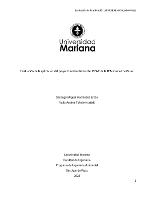Evaluación de la aplicación del proyecto ambiental escolar PRAE de la IEM Ciudad de Pasto.

Fecha
2022-02-01Autor
Toledo Hurtado, Paula Andrea
Hernandez Eraso, Santiago Miguel
Metadatos
Mostrar el registro completo del ítemResumen
El presente caso de estudio consiste en evaluar el impacto que el Proyecto Ambiental Escolar (PRAE) de la Institución Educativa Municipal Ciudad de Pasto tiene en la comunidad educativa. Para lograr este propósito, se plantearon objetivos específicos que incluyeron primero un diagnóstico del mismo, permitiendo identificar las dificultades que enfrenta la comunidad educativa en la correcta aplicación del PRAE y proponer estrategias acordes a los desafíos actuales contribuyendo al fortalecimiento y la efectividad del mismo.
Para su ejecución se realizó una investigación evaluative con enfoque mixto (cualitativo, cuantitativo), utilizando encuestas, árbol de problemas y matriz DOFA. Los resultados revelaron deficiencias en la educación ambiental en todos los niveles. Los estudiantes de grados inferiores carecían de conciencia ambiental y tendían a descartar residuos sin considerar las consecuencias. También se controlará un uso inadecuado de las instalaciones sanitarias. Los estudiantes de grados superiores tenían una comprensión parcial del PRAE y la necesidad de promover una cultura ambiental sólida.
Los docentes, administrativos y directivos mostraron un mejor entendimiento del PRAE, pero se destacó la falta de compromiso general en la transversalidad de la educación ambiental. Se resaltó la importancia de promover el proyecto de manera más efectiva y la necesidad de implementar políticas de educación ambiental.
Sin embargo, se determinó que una de las debilidades más presentes son los residuos sólidos y la deficiente difusión sobre el proyecto PRAE en la Institución, revelando así que una de las debilidades más importantes destaca la limitación de fondos y recursos, principalmente dependientes de entes gubernamentales. También se señala la falta de colaboración y compromiso de la comunidad educativa en la educación ambiental del PRAE.
En cuanto a las oportunidades, se resalta el compromiso de la institución en colaboraciones con entidades de carácter público y privado que llevaron a permitir actividades sostenibles, beneficiando la formación de los estudiantes y toda la comunidad educativa en general. Una de sus mayores fortalezas se debe a que han incluido el cumplimiento de los lineamientos del Decreto 1743 y la reputación destacada del colegio en la Ciudad de Pasto, facilitando la enseñanza de valores ambientales. Por último, pero no menos importante se determinó la falta de participación activa en el PRAE, lo que afecta la comprensión del programa y la resistencia al cambio de pensamiento. ABSTRACT: The present case study consists of evaluating the impact that the School Environmental Project (PRAE) of the Ciudad de Pasto Municipal Educational Institution has on the educational community. To achieve this purpose, specific objectives were proposed that first included a diagnosis of the same, allowing the identification of the difficulties faced by the educational community in the correct application of the PRAE and proposing strategies in accordance with the current challenges, contributing to its strengthening and effectiveness.
For its execution, an evaluative research was carried out with a mixed approach (qualitative, quantitative), using surveys, problem tree and SWOT matrix. The results revealed deficiencies in environmental education at all levels. Students in lower grades lacked environmental awareness and tended to discard waste without considering the consequences. Inappropriate use of sanitary facilities will also be controlled. Upperclassmen had a partial understanding of the PRAE and the need to promote a strong environmental culture.
Teachers, administrators and directors showed a better understanding of the PRAE, but the lack of general commitment to the transversality of environmental education was highlighted. The importance of promoting the project more effectively and the need to implement environmental education policies was highlighted.
However, it was determined that one of the most present weaknesses is solid waste and the poor dissemination of the PRAE project in the Institution, thus revealing that one of the most important weaknesses highlights the limitation of funds and resources, mainly dependent on government entities. . The lack of collaboration and commitment of the educational community in environmental education of the PRAE is also noted.
Regarding opportunities, the institution's commitment to collaborations with public and private entities stands out, which led to allowing sustainable activities, benefiting the training of students and the entire educational community in general. One of its greatest strengths is due to the fact that it has included compliance with the guidelines of Decree 1743 and the outstanding reputation of the school in the City of Pasto, facilitating the teaching of environmental values. Last but not least, the lack of active participation in the PRAE was determined, which affects the understanding of the program and resistance to change in thinking
Colecciones
- Ingeniería Ambiental [43]
Descripción
El ítem tiene asociados los siguientes ficheros de licencia:

UNIVERSIDAD MARIANA
- Calle 18 No. 34-104 Pasto (N)
- (057) + 7244460 - Cel 3127306850
- informacion@umariana.edu.co
- NIT: 800092198-5
- Código SNIES: 1720
- Res. 1362 del 3 de febrero de 1983
NORMATIVIDAD INSTITUCIONAL
PROGRAMAS DE ESTUDIO
Para la recepción de notificaciones judiciales se encuentra habilitada la cuenta de correo electronico notificacionesjudiciales@umariana.edu.co
CONVOCATORIASINSCRIPCIÓN DE HOJAS DE VIDAGESTIÓN DEL TALENTO HUMANO
POLÍTICA DE PROTECCIÓN DE DATOS PERSONALESCONDICIONES DE USO U TÉRMINOS LEGALESRÉGIMEN TRIBUTARIO ESPECIAL 2021

Copyright Universidad Mariana
Tecnología implementada por

